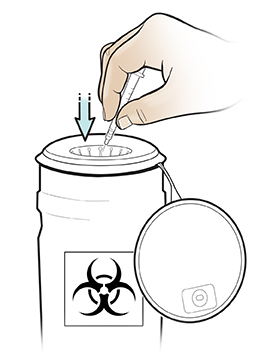A
B
C
D
E
F
G
H
I
J
K
L
M
N
O
P
Q
R
S
T
U
V
W
X
Y
Z
Click a letter to see a list of conditions beginning with that letter.
Click 'Topic Index' to return to the index for the current topic.
Click 'Library Index' to return to the listing of all topics.
Home Infusion Therapy: Handling Supplies Safely
Infusion therapy is a safe way to take medicines or fluids that can’t be taken by mouth. With infusion therapy, medicines or fluids flow through a flexible IV (intravenous) tube called a catheter into a vein. The infusion site is usually on your arm or chest. A nurse will show you how to set up your home infusion system. Treatment will become part of your daily routine. Your supplies need to be kept sterile. That means they need to be germ free. Otherwise, they aren’t safe to use. Inspect, store, and dispose of supplies as directed by the nurse.
Inspecting your supplies
Here are tips for supply inspection:
-
Check the bag or bottle for leaks, cracks, broken seals, and contents that are cloudy or discolored.
-
Check the package for your name, and for the correct medicine or fluid name. Also check the expiration date.
-
Inspect all other supplies to be sure they’re sealed, clean, and dry, and have no cracks or tears.
-
Do not use if there are any errors or problems with the medicine, fluids, or supplies. Call your nurse.
Storing your supplies
Here are tips for supply storage:
-
Keep your supplies in a clean, dry place that’s out of the reach of children and pets.
-
Never store your medicine or supplies on the floor.
-
Store medicines or fluids as directed on the label. Some may need to be refrigerated. Take out refrigerated medicine 1 to 2 hours before treatment to bring to room temperature.
Disposing of used supplies
Here are tips for supply disposal:
-
Seal used dressings and tubing in a plastic bag. Throw the bag right in the trash—unless the nurse tells you otherwise.
-
Put used needles, syringes, and other sharp items right into the sharps container without putting the caps back on. You will be instructed how to dispose of the sharps container once it is full.
 |
| Dispose of needles in an approved sharps container. |
Online Medical Reviewer:
Marianne Fraser MSN RN
Online Medical Reviewer:
Rita Sather RN
Online Medical Reviewer:
Susan K. Dempsey-Walls RN
Date Last Reviewed:
11/1/2023
© 2000-2025 The StayWell Company, LLC. All rights reserved. This information is not intended as a substitute for professional medical care. Always follow your healthcare professional's instructions.